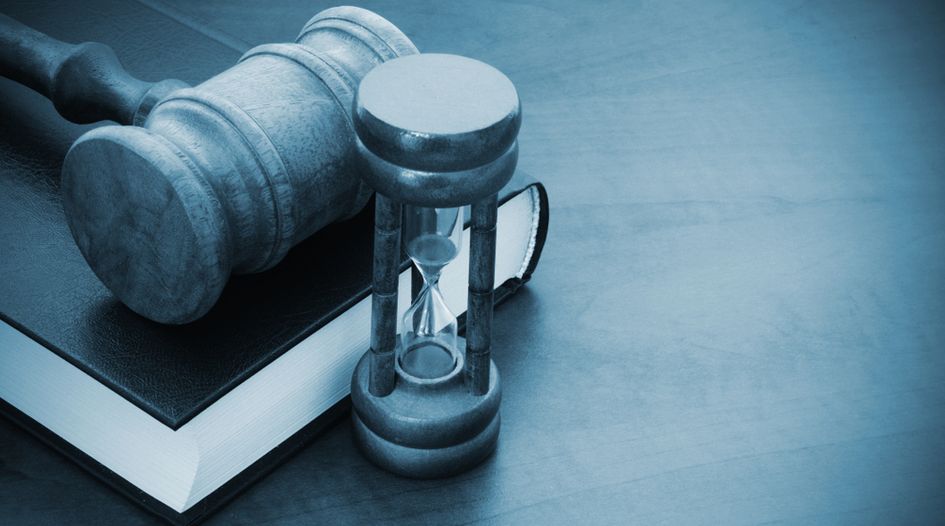Delhi High Court rules that trademark registrar has no power to extend evidence-filing period

On 9 February 2024 a Delhi High Court judge held – in an appeal following a trademark opposition proceeding – that a trademark registrar does not have discretionary power to extend the time period for filing evidence. The judge ruled that statutory provisions mandate a fixed and non-extendible timeframe (Sun Pharma Laboratories Ltd v Dabur India Ltd & Anr, CA/COMM IPD-TM, 146/2022, 9 February 2024).
Case background
Sun Pharma, the opponent, filed an appeal before the Delhi High Court after the registrar abandoned its opposition against Dabur following a delay in the service of evidence. Sun Pharma filed its evidence before the registry within the two-month deadline – however, service on Dabur was delayed by one day. When the matter was listed for hearing, Dabur alleged that Sun Pharma’s evidence was time barred and that the opposition was therefore liable to be deemed abandoned under Rule 50 of the 2002 Trade Mark Rules.
The primary question before the court was not a novel one – namely, it was a matter of whether opposition timelines under the statute are mandatory or directory.
Relevant legislation
Section 21 of the current Trade Marks Act and provisions in the Trade and Merchandise Marks Act 1958 (the previous statute) stipulate that “any evidence upon which the opponent and the applicant may rely shall be submitted in the prescribed manner and within the prescribed time to the Registrar”. These timelines are indicated in the accompanying rules – the 1959 Trade Marks Rules (for the 1958 Act) and the 2017 Rules (for the 1999 Act) that replaced the 2002 Rules.
According to Rule 53 of the 1959 Rules, after service of the counter statement, an opponent was required to file evidence within two months. If it failed to do this, the opposition would be deemed to be abandoned. Rule 50 of the 2002 Rules allowed the two-month deadline to be extended by one month with the filing of such a request before the registrar. However, under Rule 45 of the current 2017 Rules, the one-month extension that was previously prescribed under the 2002 Rules has been done away with. Thus, according to the 1999 Act and 2017 Rules, the deadline for filing evidence is two months from the date of service of the counter statement on the opponent.
Delving into the statutory provisions that enable discretionary extensions of time by the registrar, the court noted that Rule 106 of the 1959 Rules, Rule 105 of the 2002 Rules and Rule 109 of the 2017 Rules all provide that an extension request can be filed before the registrar in respect of such time periods for which no specific provision has been made in the Rules.
That said, Rule 53(2) of the 1959 Rules provided that “[i]f an opponent takes no action under sub-rule (1) within the time therein prescribed, he shall, unless the Registrar otherwise directs, be deemed to have abandoned his opposition”. The court interpreted the phrase “unless the Registrar otherwise directs” to lend a directory touch to the provision. However, this phrase has been deleted in corresponding provisions of the 2002 and 2017 Rules, implying that the registrar’s power to extend the evidence-filing time period has been withdrawn under the current framework.
Judicial precedents
This interpretation was not without precedent. In Sunrider v Hindustan Lever (2007 SCC Online Del 1018), the Delhi High Court interpreted Rule 50 of the 2002 Rules as mandatory in nature because of the word “aggregate” in Rule 50(1): “within such a further period not exceeding one month in the aggregate thereafter as the Registrar may on request allow”, and because of the omission of the phrase used in the 1959 Rules - “unless the Registrar otherwise directs”.
Similarly, in Mahesh Gupta v Registrar of Trademarks (2023 SCC Online Del 1324), the Delhi High Court held that Rule 50(1) gave the registrar the power to extend the time period for filing evidence only up to one month, and that the words “not exceeding one month” made this mandatory. Moreover, Rule 105 pertaining to discretionary extensions was irrelevant to the discussion as it only covered situations where the statutory framework was silent on time periods, which was not the case here.
Key findings
The court stated that:
…the discretion, which was vested with the Registrar, has been taken away and the time period for filing of evidence has also been reduced…The above transition and evolution of the Rules points to a clear intention to ensure that strict timelines are prescribed for conclusion of pleadings/evidence in opposition proceedings… extensions cannot be granted, when the time periods are specifically prescribed in the Rules.
Holding that an opposition cannot be abandoned merely because of a delay in service of evidence (which was otherwise filed at the registry in a timely manner), the court also ruled that the time period for filing evidence is fixed and non-extendible. The decision emphasises that the purpose of the statute is to ensure that strict timelines are adhered to and that repeated extensions do not stall the trademark registration process.
WTR recommends
Good news for L’Oréal as General Court upholds opposition against LA CRÈME LIBRE
Asia-Pacific suffers cross-regional filing decline
Yves Saint Laurent unsuccessful in opposition against ‘USL’ monogram
This is an Insight article, written by a selected partner as part of WTR's co-published content. Read more on Insight
Copyright © Law Business ResearchCompany Number: 03281866 VAT: GB 160 7529 10

